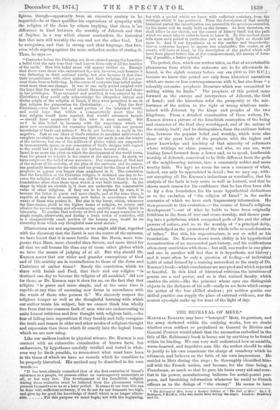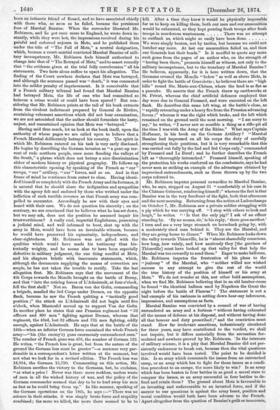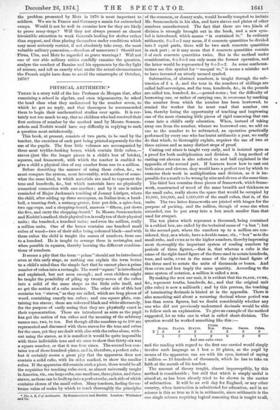THE BETRAYAL OF METZ.*
MARSHAL BAZAINE may have "betrayed" Metz, its garrison, and the army sheltered within the outlying works, but we doubt whether even soldiers so prejudiced as General de Riviere and General Pourcet would admit that the accusation embodied in the title of Mr. Robinson's book is borne out by anything to be found within its binding. •We can very well understand how an amiable, warm-hearted, and impulsive man like the author should be able to justify to his own conscience the charge of treachery which he advances, and believes on the faith of his own impressions. He resided in Metz during the siege ; he thoroughly identified him- self with the French nation, and became, for the time being, a Frenchman, so much so that he gave his hosts every aid and com- fort in his power, manufacturing balloons for aerial-postal pur- poses, and furnishing information whenever he could to French officers as to the doings of " the enemy." He seems to have • The Betrayal of Metz, being a Recited Edition of •The Fall of Metz." By J. T. Robinson, F.R.I.B.A. (who was inside Metz daring the siege). London : Bradbury and Co.
been an intimate friend of Rossel, and to have associated chiefly with those who, as soon as he failed, became the persistent foes of Marshal Bazaine. When the surrender liberated Mr. Robinson, and he got once more to England, he wrote down in- stantly, while they were hot, the impressions received during his painful and enforced sojourn in Metz, and he published them under the title of "The Fall of Metz," a neutral designation, which, because a court-martial convicted Marshal Bazaine of mili- tary incompetency, Mr. Robinson feels himself authorised to change into that of " The Betrayal of Metz," and to assert roundly that " the evidence given at the trial fully corroborates " all his statements. Two facts alone suffice to upset his allegation. The finding of the Court nowhere declares that Metz was betrayed, and although the sentence passed was " death," it was commuted into the milder penalty of imprisonment. Is it conceivable that if a French military tribunal had found that Marshal Bazaine had betrayed Metz, the life of one who had committed so heinous a crime would or could have been spared? But con- sidering that Mr. Robinson prints at the tail of his book extracts from the virulent indictment prepared by General de Riviere, containing vehement assertions which did not bear examination, we are not astonished that the author should formulate the hasty, unjust, and unsustained opinion that Metz was "betrayed."
Having said thus much, let us look at the book itself, upon the authority of whose pages we are called upon to believe that a French Marshal deliberately betrayed his country. The spirit in which Mr. Robinson entered on his task is very early disclosed. He begins by describing the German invasion as " a pent-up tor- rent of rude northern people, once more flooding the valleys of the South," a phrase which does not betray a nice discrimination either of modern history or physical geography. He follows up this characteristic opening. by speaking of the French as " our " troops, " our " artillery, " our " forces, and so on. And in that frame of mind he continues from outset to close. Having identi- fied himself so completely with the French Army and its fortunes, it is natural that he should share the indignation and sympathise with the agony felt and endured by those who writhed under the infliction of such terrible reverses as that French army was com- pelled to encounter. Accordingly he saw with their eyes and heard with their ears. We do not question his sincerity ; on the contrary, we are convinced that he believes what he has set down, but we may ask, does not the position he assumed impair his trustworthiness? A really cool, impartial Englishman, possessing a judicial mind, and well informed to boot, shut up with the army in Metz, would have been an invaluable witness, because he would have preserved his equanimity, independence, and clear-sightedness. Mr. Robinson was not gifted with the qualities which would have made his testimony thus his- torically weighty, and he seems also to` have been especially defective in military judgment, the one thing needful at Metz, and his chapters bristle with inaccurate statements, which, although the documents supplying the means of correction are ample, he has not taken the trouble to rectify. Take the last allegation first. Mr. Robinson says that the movement of the 4th Corps towards the Moselle brought on the battle of Borny, and that "into the retiring forces of L'Admirault, at four o'clock, fell the first shell." Not so. Baron von der Goltz, commanding a brigade, assailed the 3rd Corps under Decaen, on the opposite flank, because he saw the French quitting a "tactically good position ;" the attack on L'Admirault did not begin until five o'clock, when Manteufel moved up to support Von der Goltz. In another place he states that one Prussian regiment lost "32 officers and 890 men" fighting against Decaen, whereas that regiment, the 43rd, lost 32 officers and 735 men fighting, oddly enough, against L'Admirault. He says that at the battle of the 16th—when an inferior German force contained the whole French army—" his (the enemy's) guns enormously outnumbered ours." The number of French guns was 476, the number of German 122. He writes, "the French loss is great, but from the nature of the ground the German loss must be greater "—a sentence very par- donable in a correspondent's letter written at the moment, but not what we look for in a revised edition. The French loss was 16,954, the German 15,790. Commenting on this action, Mr. Robinson ascribes the victory to the Germans, but, he exclaims, "at what a price ! Never was there more reckless, useless waste of men in all the wicked history of war, and the policy of the German commander seemed that day to be to hurl away his men as fast as he could bring them up." In like manner, speaking of the German operations on the 18th, he says :—" There was no science in their attacks, it was simply brute force and stupidity combined ; the more we killed, the more there seemed to be to kill. After a time they knew it would be physically impossible for us to keep on killing them, both our men and our ammunition would be exhausted, so they kept pouring fresh troops after fresh
troops in murderous wantonness. There was no attempt to outflank us, which might so easily have been done
We were simply beaten, not by tactics, but because we could not butcher any more. At last our ammunition failed us, and then our Generals lost their heads." Is it needful to quote any more such gems from the pages of an author who, on the strength of "having been there," presents himself as witness, not only to the military incompetence, but to the treachery of Marshal Bazaine ? He believes, apparently, for it is here written down, that the Germans crossed the Moselle " below " as well as above Metz, in order to fight the battle of Gravelotte ; he believes there are "high hills" round Ste. Marie-aux-Chenes, where the land is as flat as a pancake. He asserts that the French threw up earthworks at St. Privat, whereas the chief artificial defences employed that day were due to General Frossard, and were executed on the left flank. He describes this same left wing, at the battle's close, as " rapidly retreating under a heavy fire from the Prussian advancing forces ;" whereas it was the right which broke, and the left which remained on the ground until the next morning. " I am sorry to say," he writes, " I never saw so sensible a thing as a rifle-pit all the time I was with the Army of the Rhine." What says Captain Hofbauer, in his book on the German Artillery ? "Marshal Bazaine had impressed on all his corps the duty of carefully strengthening their positions, but it is very remarkable that this. was carried out fully by the 2nd and 3rd Corps only," commanded by Frossard and Le Bceuf ; and he further describes the French left as "thoroughly intrenched." Frossard himself, speaking of the protection his works conferred on the combatants, says he had never seen so striking an example of the advantages obtained by improvised entrenchments, such as those thrown up by the two corps referred to.
Mr. Robinson imputes personal cowardice to Marshal Bazaine, who, he says, stopped on August 31 " comfortably at his ease in the Chateau Grimont, reinforcing himself ;" whereas the fact isthat Bazaine was in the very forefront of the fight, both that afternoon and the next morning. Returning from the action at Ladonchamps on October 7, Mr. Robinson saw a private soldier struggling with a pig which he was carrying off. " I stop with others to look and laugh," he writes. " ' Is that the only pig?' I ask of an officer standing by. By no means, sir,' is his reply, there goes another.' I turn and see a very large stomach on horseback going by, with a moderately sized man behind it. They are the Marshal, and they are going home to, dinner." When Mr. Robinson looks down the valley towards Thionville, he is " almost shamefully conscious, how long, how vainly, and how anxiously they [the garrison of Thionville] must have looked up that valley for that help the Marshal was too cowardly to send them." Eager to make balloons, Mr. Robinson imputes the frustration of his plans to the " jealousy" of the Marshal, who " neither willed nor wished success to any attempt to give the rest of the world the true history of the position of himself or his army at Metz." We do not wonder at this, nor other bold assumptions, when we find Mr. Robinson believing that in an old lumber-room he found " the identical balloon used by Napoleon the Great the night before the battle of Fleurus " ! The statement is not a bad example of his rashness in setting down hear-say inferences, impressions, and assumptions as facts.
Marshal Bazaine was convicted by a council of war of having surrendered an army and a fortress " without having exhausted all the means of defence at his disposal, and without having done all that honour and duty prescribed ;" and the conviction must stand. How far irrelevant assertions, industriously circulated for three years, may have contributed to the verdict, we shall
not inquire, but it differs materially from the accusation for- mulated and nowhere proved by Mr. Robinson. -In the interests
of military science, it is a pity that Marshal Bazaine did not per- sistently endeavour to break out, because then the vital questions involved would have been tested. The point to be decided is this. Is an army which commands the issues from an entrenched camp, or an army which has to fight for those issues as a condi- tion precedent to an escape, the more likely to win? Is an army which has been beaten in four battles in as good a moral state to conquer the issues, as an army successful in four battles to de- fend and retain them? The ground about Metz is favourable to an investing and unfavourable to an invested force, and if the answer to our questions is against the army beset, position and moral condition would both have been adverse to the French. Apart altogether from the question of Bazaine's guilt or innocence,
the problem presented by Metz in 1870 is most important to soldiers. We see in France and Germany a mania for entrenched camps. Would it not be well to examine how far they are likely to prove army-traps? Will they not always present an almost irresistible attraction to weak Generals looking for shelter rather than support, and thus placing themselves under conditions which may most seriously restrict, if not absolutely take away, the most valuable military possession,—freedom of manoeuvre? Should not Pirna, Ulm, and Metz be regarded as grave warnings ? Will not one of our able military critics candidly examine the question, analyse the conduct of Bazaine and his opponents by the dry light of science, and tell LIB exactly what under the actual circumstances the French might have done to avoid the catastrophe of October, 1870 ?




































 Previous page
Previous page